Types of Dental Crowns
In order to preserve a damaged tooth or to replace it, dentists often offer their patients to install a micro prosthesis — a dental crown. Each such crown has its own characteristics, and it is better to study all the information about them before installation.
5-Minute Crafts is going to tell you what types of dental crowns exist and what the differences between them are.
What a dental crown is and when it should be installed
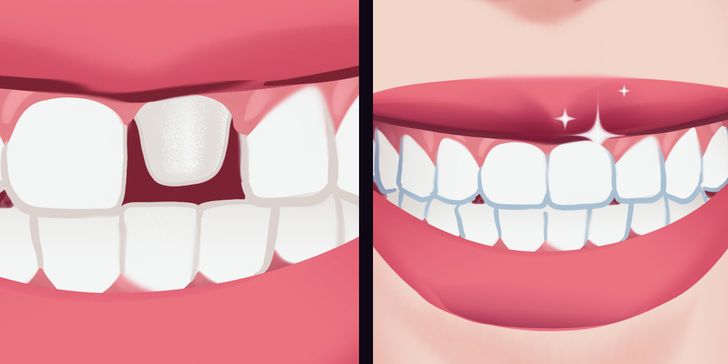
A dental crown is an orthopedic secured consctruction that covers the upper, coronal, part of the tooth.
Reasons for installing a dental crown can be different and it’s only your dentist who can recommend installing the micro prosthesis for you. Oftentimes, crowns are installed for the following reasosn:
- A tooth is weakened after a severe treatment. In this case, the crown will have protective functions and won’t let the tooth decay.
- A tooth is cracked and is severely damaged. The crown will not only protect but also help join the parts of the tooth.
- When there are large fillings. Crowns support teeth, the main part of which is covered by fillings.
- A tooth has an unaesthetic effect — not a beautiful color, shape, size. Crowns can be used to restore broken or badly worn teeth and to make your smile more attractive.
Advantages and disadvantages of dental crowns
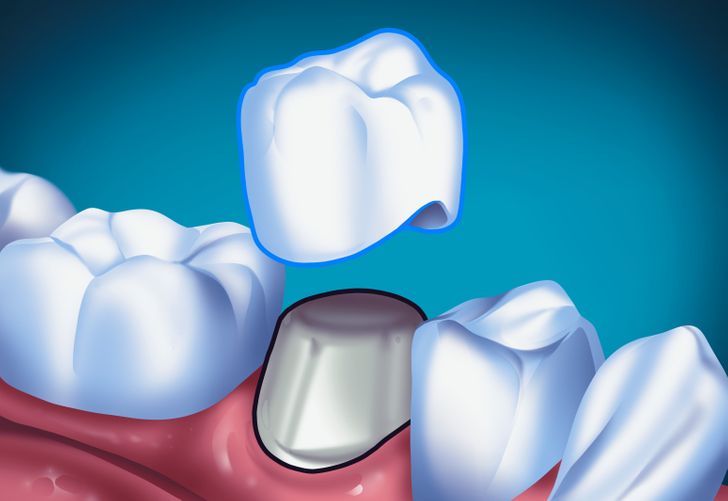
Just like other methods of teeth restoration, dental crowns have their advantages and disadvantages.
Advantages:
- Simple and almost painless installation
- Affordable cost
- Long durability (if taken care of properly, it can serve for 15-30 years), and the risk of deformation is quite low
- Natural look
- Chance to save damaged or decaying teeth
- Opportunity to choose material for manufacturing the cap depending on your possibilities and opportunities
Disadvantages:
- Natural tooth structure is permanently removed before placement
- The necessity of a replacement after some time
- Poorly adjusted crowns can loosen and fall out
- A crown can be broken or damaged
- After installation, the sensitivity of teeth can increase
Types of dental crowns
Dental crowns are made from various materials that affect the properties of the caps.
The most widespread materials for producing crowns are:
- Ceramic — the color of the cap is adjusted to the color of other teeth
- Porcelain fused to metal — the upper part of such a cap is ceramic that is fused to an inner metal crown
- Metal alloys — gold, platinum, palladium, and non-precious metals
- Zirconia — combines the durability of metal and an aesthetic natural look
- All-resin — oftentimes such crowns are used as a temporary measure as they are not long-lasting
All-ceramic (porcelain)
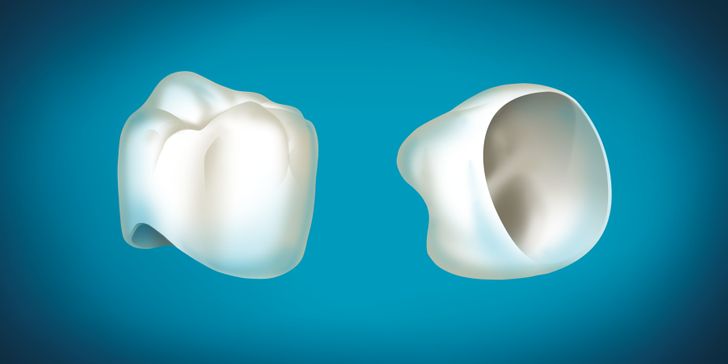
All-ceramic crowns are one of the most popular ones, especially thanks to the fact they can be perfectly adjusted by the shape, size, and color according to the look of other teeth.
Porcelain is a biocompatible and toxic-free material. It doesn’t cause allergic reactions and is accepted by the body well. In most cases, porcelain crowns are recommended by dentists for the restoration of frontal teeth.
The downside of these caps can be their high price and low strength of such a crown. As a rule, ceramic prostheses cost much more than other options but they can’t boast high durability. In addition, they are able to cause the wearing down of opposing teeth (the ones that will be located under the tooth with a crown).
Pros:
- Looks natural
- the material is biocompatible and toxic-free
Cons:
- Quite pricey
- Are not quite durable
- Can cause wearing down of opposing teeth
- Oftentimes can’t be installed within one visit
Zirconia
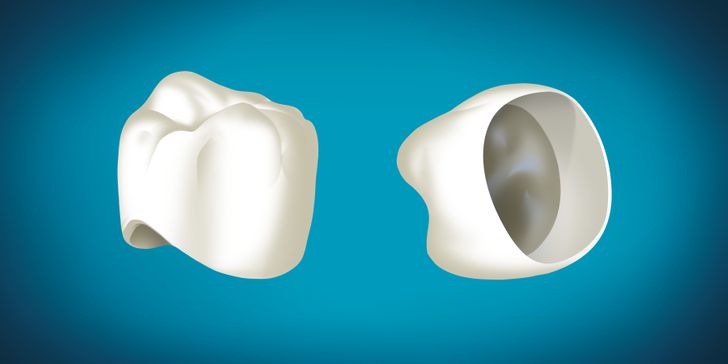
Zirconia crowns combine the strength of metal and an aesthetic look. They are stronger than porcelain, but due to their opacity, they often need additional coating.
The material is biocompatible, which is why such crowns don’t cause any side reactions and are suitable for people with allergies. However, just like porcelain crowns, zirconia crowns are quite pricey and wears down opposing teeth. Moreover, due to the specifics of the material this type of micro protheses is not easy to adjust.
Pros:
- Durable
- Aesthetic
- Made from biocompatible and non-toxic material
- Don’t require long tooth preparation
Cons:
- Pricey
- Difficult to adjust
- Cause wearing down of opposing teeth
Porcelain fused to metal
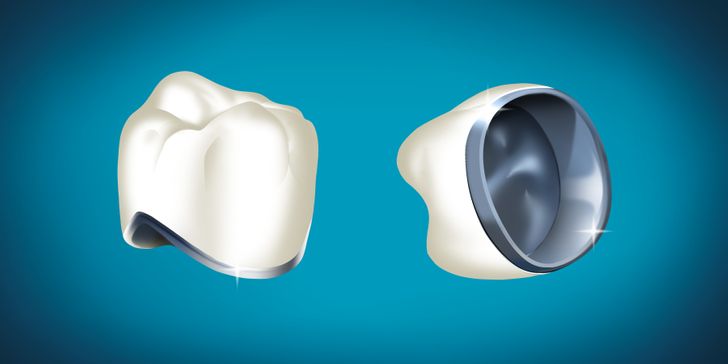
Porcelain fused to metal crowns consist of 2 parts: a metal base and porcelain cap. This crown can perfectly imitate the shape, color, and size of other teeth and can last for a long time.
The main inconvenience of the porcelain fused to metal crown is the place between the gum and the crown, which will be seen when smiling. Moreover, crowns with such a composition don’t suit everyone — in some cases, they can cause allergic reactions.
Pros:
- Strong and durable
- Aesthetic
- Are cheaper than ceramic or zirconia crowns
Cons:
- The securing point (the gray line between the tooth and the gum) remains visible
- They can chip or damage opposing teeth
- Can cause allergy
- Significant tooth reduction is required for them
Metal
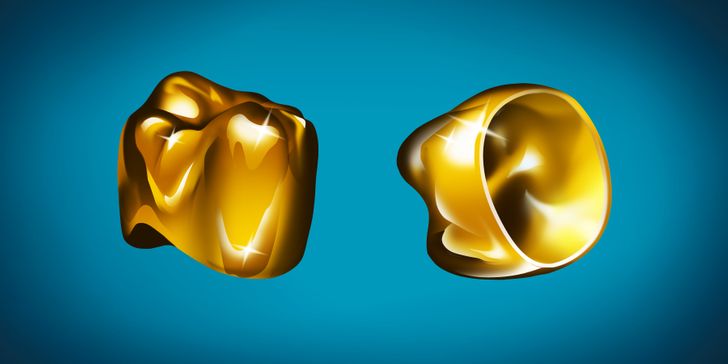
The all-metal crown is the most durable option. It preserve a significant part of the tooth when installing it and wears down as fast as the natural tooth enamel does.
The biggest downside of such crowns is their unnatural look and the possibility of getting an allergic reaction.
Pros:
- Strongest and most durable
- Wear down less than other types of crowns
- Shape and size can be easily adjusted to the tooth
- Doesn’t cause wearing down the opposing teeth very much
- Less of the natural tooth has to be removed when installing the crown
- Cheaper than other options
Cons:
- Will differ greatly by color from other teeth
- Can cause allergic reactions
- Can’t be completed in one appointment
All-resin
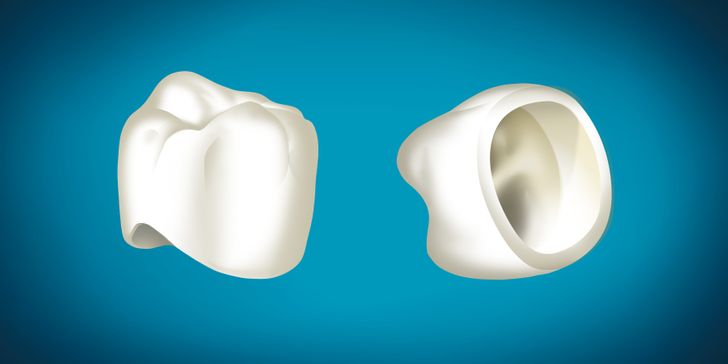
All-resin crowns are the cheapest, however, dentists rarely recommend installing them. It is connected with their fragility. They can’t serve long due to their vulnerability to wearing down and damages.
Pros:
- Not a high price
Cons:
- Fragility and low wear resistance